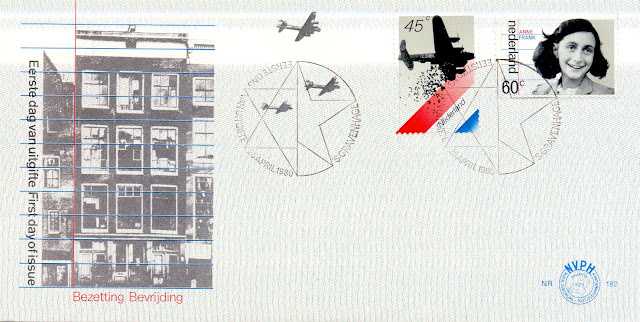(45c) British Liberator bomber throws food parcels during the Liberation Phase of the Second World War.
(60c) Family portrait of Anne Frank.
Annelies Marie Frank (12 June 1929 – February or March 1945) was a German-born diarist and writer. One of the most discussed Jewish victims of the Holocaust, she gained fame posthumously following the publication of her diary, The Diary of a Young Girl (originally The Secret Annex),which documents her life in hiding from 1942 to 1944, during the German occupation of the Netherlands in World War II. It is one of the world's most widely known books and has been the basis for several plays and films.
Born in Frankfurt, Germany, she lived most of her life in or near Amsterdam, Netherlands, having moved there with her family at the age of four-and-a-half when the Nazis gained control over Germany. Born a German national, Frank lost her citizenship in 1941 and thus became stateless. By May 1940, the Franks were trapped in Amsterdam by the German occupation of the Netherlands. As persecutions of the Jewish population increased in July 1942, the family went into hiding in some concealed rooms behind a bookcase in the building where Anne's father worked. From then until the family's arrest by the Gestapo in August 1944, Anne kept a diary she had received as a birthday present, and wrote in it regularly. Following their arrest, the Franks were transported to concentration camps. In October or November 1944, Anne and her sister, Margot, were transferred to Bergen-Belsen concentration camp from Auschwitz, where they died (probably of typhus) a few months later. They were originally estimated by the Red Cross to have died in March, with Dutch authorities setting 31 March as their official date of death, but research by the Anne Frank House in 2015 suggests they more likely died in February.
Frank's father, Otto, the only survivor of the family, returned to Amsterdam after the war to find that her diary had been saved by one of the helpers, Miep Gies, and his efforts led to its publication in 1947. It was translated from its original Dutch version and first published in English in 1952 as The Diary of a Young Girl, and has since been translated into over 60 languages.

No comments:
Post a Comment